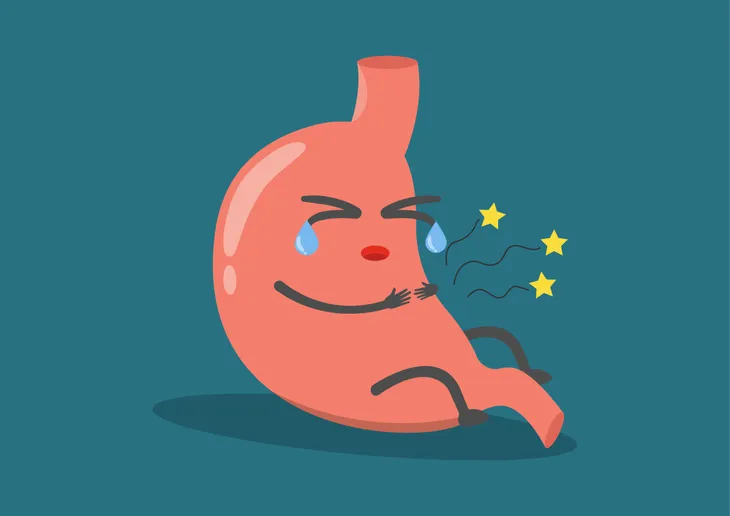Lactose intolerance refers to individuals who are unable to digest lactose (or sugars from dairy products) due to a deficiency of lactase (an enzyme produced in the small intestine). Without enough lactase, the body is unable to break down lactose into glucose to be absorbed into the bloodstream for energy.
Although it’s not dangerous, being lactose intolerance can be uncomfortable when dairy products are consumed. The only way to avoid the discomfort is to avoid foods and drinks that contain lactose or by taking lactase digestive enzyme supplements. To determine whether or not you’re lactose intolerant, read about these common symptoms and the available tests that can help reach a diagnosis…
Want diet & nutrition content delivered straight to your inbox? Sign up for our exclusive diet & nutrition newsletter!
1. Stomach Pain
One of the most common symptoms of lactose intolerance is stomach pain. Usually when a person suffers from any kind of stomach ache or pain, they assume it’s most likely due to something they ate, especially if that person is lactose intolerant. A person will experience this pain because their body is unable to break down lactose.
“Carbohydrates such as lactose cannot be absorbed by the cells lining the colon, but they can be fermented and broken down by the naturally occurring bacteria that live there, known as the microflora,” writes Healthline. As the fermentation of lactose occurs, it releases hydrogen, methane, and carbon dioxide gases, which is what causes the stomach pain and cramps.
2. Distended Stomach
Most of us have experienced bloating at one point or another in our lives, and it’s definitely not a nice thing to deal with. Our clothes feel tighter, sitting can be uncomfortable, and we’re just all around uncomfortable. Unfortunately, bloating is another side effect of lactose intolerance. It occurs when the there’s an increase in water and gas in the colon, which causes distention (basically just the gut walls stretching outwards). Think of the gut as a balloon!
The amount a person bloats doesn’t depend on how much lactose they consume, so you can suffer from a distended stomach even if you’ve had just a little bit of dairy. It all depends on your sensitivity level. This symptom might cause other symptoms on this list, such as nausea and vomiting.
3. Diarrhea
Diarrhea isn’t a pleasant thing to talk about, but it’s a harsh reality for someone who is lactose intolerant. Healthline defines diarrhea as “increased stool frequency, liquidity, or volume.” The source also notes that it’s when someone passes more than 7-ounces of stool in a 24-hour period.
Diarrhea occurs when there’s an increase in water in the colon, which is why the stools have so much liquid content. “In the colon, microflora ferment lactose to short-chain fatty acids and gases. Most, but not all, of these acids are absorbed back into the colon. The leftover acids and lactose increase the amount of water that the body releases into the colon,” explains Healthline. The source also notes that in order for diarrhea to occur, the body must have consumed the equivalent of 3- to 4-cups of milk.
4. Embarrassing Gas
Flatulence, or excessive gas, can be quite embarrassing and suppressing it will only cause serious discomfort. Unfortunately, it’s a common symptom for lactose intolerance. “The fermentation of lactose in the colon increases the production of the gases hydrogen, methane, and carbon dioxide,” writes Healthline.
People who are lactose intolerant have microflora in their colon that is very good at fermenting lactose into acids and gases, which results in embarrassing gas. The amount of gas varies from person to person, especially since every person’s microflora is different. It all depends on the efficiency of the microflora, as well as the rate of gas reabsorption by the colon.
5. Nausea and Vomiting
As we previously mentioned, bloating can cause a person to feel nauseous and even cause them to vomit, which is why it’s listed as one of the symptoms of being lactose intolerant. According to Healthy Women, someone who’s lactose intolerant can feel ill anywhere from 30-minutes to 2-hours after eating dairy products.
6. Gurgling Stomach
There’s nothing more embarrassing than a stomach that’s making gurgling noises. It can cause a few turned heads, and for most of us, this happens when we’re hungry. But when someone is lactose intolerant, it’s because their intestines (which are probably already filled with gas and water) are trying to break down the lactose, writes Healthy Women.
7. Constipation
While most individuals with lactose intolerance will experience diarrhea, there are a few who will have constipation. According to Healthline, constipation is characterized by “hard, infrequent stools, feelings of incomplete bowel movements, stomach discomfort, bloating, and excessive straining.” While it’s not commonly associated with lactose intolerance, it has been reported as a symptom.
Constipation occurs “as bacteria in the colon ferment undigested lactose, they produce methane gas,” writes Healthline. This slows down the digestion process, including how long it takes for food to pass through the gut, which results in constipation.
8. You’re Not an Infant
You might not have realized this, but there are different types of lactose intolerance. Some are born with it and some develop it as an adult, while others develop it because of damage to the small intestine. It would be extremely rare for someone to be born without any lactase at all, says Reader’s Digest.
The National Institute of Diabetes and Digestive and Kidney Diseases says that most cases of lactose intolerance develop after the age of 2, while the U.S. National Library of Medicine points out that lactose intolerance is not all that uncommon. In fact, the source states that about 30-million adults in the U.S. will develop lactose intolerance by the age of 20.
9. You’re of Certain Ethnicity
Certain ethnicities are more prone to being lactose intolerant than others. While we were all at one point fed lactase through our mother’s milk as a child, according to an article in the New York Times, humans only began digesting lactose as adults about 5,000 years ago. It all started with cattle herders in northern Europe who used it to survive. “Though genetics that allow for the presence of lactase in the body have spread in large portions of Caucasian and East African populations, East Asian, South Asian, and other African populations have much higher incidences of adults experiencing symptoms of lactose intolerance,” writes Reader’s Digest.
If you suffer from these symptoms, you might suffer from lactose intolerance. However, a diagnosis will need to be made by your doctor using these tests before you can be labeled lactose intolerant.
10. Lactose Tolerance Test
A lactose tolerance test is used to see how the body reacts when high levels of lactose are ingested. You’ll be required to drink a liquid that contains lactose and “two hours after drinking the liquid, you’ll undergo blood tests to measure the amount of glucose in your bloodstream,” explains the Mayo Clinic. If levels don’t rise, it means your body isn’t properly digesting and absorbing the lactose drink.
11. Hydrogen Breath Test
A hydrogen breath test is the best and easiest way to determine whether or not a person is lactose intolerant. In order to have the test done, you will have to avoid consuming any food or drink the night before so that it can’t be confused with the next day’s results. You’ll breathe into “a balloon-like bag,” writes NHS, so the doctor can test how much hydrogen is present in the body.
You’ll then have to drink a lactose solution and test your breath every 15-minutes in the following hours to see if the level of hydrogen has increased. If it has, it means you’re lactose intolerant. “This is because lactose intolerance can cause the bacteria in the colon to produce more hydrogen than normal,” says NHS.
12. Stool Acidity Test
This test isn’t as common and is mostly saved for adults or children who can’t undergo the other tests, says the Mayo Clinic. Your health care professional will test the amount of lactic acid and other acids in a stool sample, and if they are increased, it means you are lactose intolerant.















